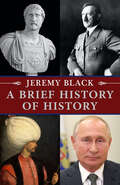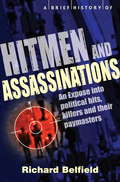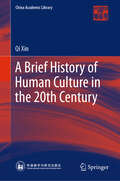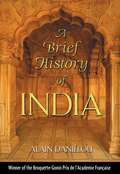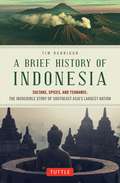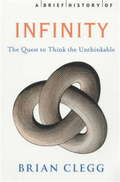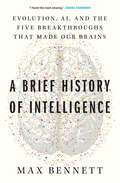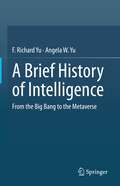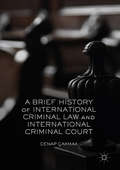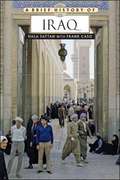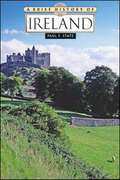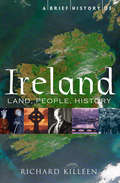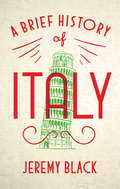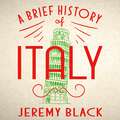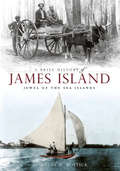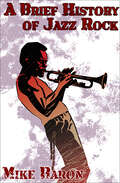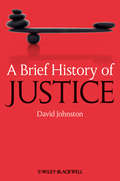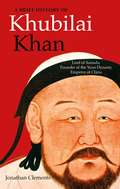- Table View
- List View
A Brief History of High-Speed Rail
by Qizhou Hu Siyuan QuThis book introduces the basic knowledge, concepts, terms and development process of high-speed rail (HSR) and summarizes its main achievements at this stage. It mainly expounds the connotation of high-speed rail to readers from two different aspects of theory and technology. The book explains the development process of high-speed rail in terms of time: yesterday's wheel rail high-speed rail, today's maglev high-speed rail and tomorrow's super high-speed rail; and also spatially, making a comparative analysis of the development around the world.This book can be used as a reading material for scientific researchers, engineering technicians, management workers, teachers and students of colleges and universities as well as high-speed railfans.
A Brief History of History
by Jeremy BlackIn A Brief History of History, acclaimed historian Jeremy Black seeks to reinvigorate and redefine our ideas about history. The stories we tell about the past are a crucial aspect of all cultures. However, while the traditional storytelling process—what we think of as "history" in the proper sense—is useful, it is also misleading, not least because it leads to the repetition of bias and misinformation. Black suggests that the conventional idea of history and historians is constructed too narrowly, as it fails to engage with the broad nature of lived experience. By focusing on a singular idea or story within the history being explored, we fail to understand the interconnectivity of the everyday experience. A Brief History of History challenges accepted norms of the historical perspective and offers a view of human history that will surprise many and (perhaps) infuriate some. But above all, it is a history of historians written for this moment in time, a time when the traditional Eurocentric approach to history now appears wholly inappropriate.
A Brief History of Hitmen and Assassinations (Brief Histories )
by Richard BelfieldThe true stories behind some of the most shocking assassinations in recent history.We live in a new age of political assassination; within our lifetimes all the senior members of the UN Security Council have used it as an extension of political policy in all corners of the globe. In every case, the orders came from the very top. Today, while leading governments use covert ops, drones and lazer guided missiles, the terrorist methods of car bombs and suicide bombers make the game even more dangerous. In his compelling history of hit men, assassinations and the men who command them, Richard Bellfield recalls the major hits in history from Julius Caesar to twenty of the most shocking assassinations in recent history.He also reveals: how the assassination of President Sadat of Egypt launched Al Qaeda. How President Kennedy ordered the death of President Diem of Vietnam. And with excerpts from CIA and Al Qaeda manuals he shows how they have changed the course of history. He also uncovers the hidden world of killers and cover ups.
A Brief History of Hitmen and Assassinations (Brief Histories)
by Richard BelfieldThe true stories behind some of the most shocking assassinations in recent history.We live in a new age of political assassination; within our lifetimes all the senior members of the UN Security Council have used it as an extension of political policy in all corners of the globe. In every case, the orders came from the very top. Today, while leading governments use covert ops, drones and lazer guided missiles, the terrorist methods of car bombs and suicide bombers make the game even more dangerous. In his compelling history of hit men, assassinations and the men who command them, Richard Bellfield recalls the major hits in history from Julius Caesar to twenty of the most shocking assassinations in recent history.He also reveals: how the assassination of President Sadat of Egypt launched Al Qaeda. How President Kennedy ordered the death of President Diem of Vietnam. And with excerpts from CIA and Al Qaeda manuals he shows how they have changed the course of history. He also uncovers the hidden world of killers and cover ups.
A Brief History of Human Culture in the 20th Century (China Academic Library)
by Qi XinThis book examines the cultural concepts that guided the development of the “age of mankind”— the changes that took place in historical, philosophical, scientific, religious, literary, and artistic thought in the 20th century. It discusses a broad range of major topics, including the spread of commercial capitalism; socialist revolutions; the two world wars; anti-colonialist national liberation movements; scientific progress; the clashes and fusion of Eastern and Western cultures; globalization; women’s rights movements; mass media and entertainment; the age of information and the digital society. The combination of cultural phenomena and theoretical descriptions ensures a unity of culture, history and logic. Lastly, the book explores the enormous changes in lifestyles and the virtualized future, revealing cultural characteristics and discussing 21st -century trends in the context of information technology, globalization and the digital era.
A Brief History of Image Science and Technology in China
by Congyao HanThis book, within the vision of the study on the image history, clearly manifests the development of Chinese image science and technology of over 2000 years based on compendium, while having briefly sorted out expositions by scientists since ancient times in China, demonstrates the spiritual course, ideas of thinking and forms of life and reveales profound humane ideas, basis of sentiments and styles of the spirit featured by Chinese image culture. The historic outline of images is clear-cut along with authenticated inter-attestation for clues of images and texts. Historic facts concerning images are ecologically diversified, while historic documents about images are properly chosen, in addition to the integration between liberal arts and science and perfect combination between images and texts. Blessed with nice integration between images and texts, this book serves as reference to experts, scholars, undergraduates and postgraduates related to the study on image history, history of science and technology, study of history and news communication.
A Brief History of India
by Alain Daniélou Kenneth F. HurryDaniélou's powerful rebuttal to the conventional view of India's history, which calls for a massive reevaluation of the history of humanity• Explores historical occurrences from each major time period starting with the first appearance of man 30,000 years ago• Couples the clarity and perspective of an outsider with the unique and specific knowledge of an insider• By the internationally recognized Hindu scholar and translator of The Complete Kama Sutra (200,000 copies sold)Alain Daniélou approaches the history of India from a new perspective--as a sympathetic outsider, yet one who understands the deepest workings of the culture. Because the history of India covers such a long span of time, rather than try to create an exhaustive chronology of dates and events, Daniélou instead focuses on enduring institutions that remain constant despite the ephemeral historical events that occur. His selections, synthesis, and narration create a thoroughly engaging and readable journey through time, with a level of detail and comprehensiveness that is truly a marvel.Because of the continuity of its civilization, its unique social system, and the tremendous diversity of cultures, races, languages, and religions that exist in its vast territory, India is like a history museum. Its diverse groups maintained their separate identities and never fully supplanted the culture and knowledge of their predecessors. Even today one may encounter in India primitive Stone Age people whose technology has remained at what is considered prehistoric levels. Thus Daniélou's examination of India reveals not only the diversity and historical events and trends of that country, but also the history of all mankind. Through Daniélou's history of India we learn from whence we came, what we have discovered over the years in the fields of science, arts, technology, social structures, religions, and philosophical concepts, and what the future may hold for us.
A Brief History of Indonesia
by Tim HanniganSultans, Spices, and Tsunamis: The Incredible Story of the World's Largest Archipelago Indonesia is by far the largest nation in Southeast Asia and has the fourth largest population in the world after the United States. Indonesian history and culture are especially relevant today as the Island nation is an emerging power in the region with a dynamic new leader. It is a land of incredible diversity and unending paradoxes that has a long and rich history stretching back a thousand years and more. Indonesia is the fabled "Spice Islands" of every school child's dreams—one of the most colorful and fascinating countries in history. These are the islands that Europeans set out on countless voyages of discovery to find and later fought bitterly over in the 15th, 16th and 17th centuries. This was the land that Christopher Columbus sought and Magellan actually reached and explored. One tiny Indonesian island was even exchanged for the island of Manhattan in 1667! This fascinating book tells the story of Indonesia as a narrative of kings, traders, missionaries, soldiers and revolutionaries, featuring stormy sea crossings, fiery volcanoes, and the occasional tiger. It recounts the colorful visits of foreign travelers who have passed through these shores for many centuries—from Chinese Buddhist pilgrims and Dutch adventurers to English sea captains and American movie stars. For readers who want an entertaining introduction to Asia's most fascinating country, this is delightful reading.
A Brief History of Indonesia
by Tim HanniganSultans, Spices, and Tsunamis: The Incredible Story of the World's Largest ArchipelagoIndonesia is by far the largest nation in Southeast Asia and has the fourth largest population in the world after the United States. Indonesian history and culture are especially relevant today as the Island nation is an emerging power in the region with a dynamic new leader. It is a land of incredible diversity and unending paradoxes that has a long and rich history stretching back a thousand years and more.Indonesia is the fabled "Spice Islands" of every school child's dreams-one of the most colorful and fascinating countries in history. These are the islands that Europeans set out on countless voyages of discovery to find and later fought bitterly over in the 15th, 16th and 17th centuries. This was the land that Christopher Columbus sought and Magellan actually reached and explored. One tiny Indonesian island was even exchanged for the island of Manhattan in 1667!This fascinating book tells the story of Indonesia as a narrative of kings, traders, missionaries, soldiers and revolutionaries, featuring stormy sea crossings, fiery volcanoes, and the occasional tiger. It recounts the colorful visits of foreign travelers who have passed through these shores for many centuries-from Chinese Buddhist pilgrims and Dutch adventurers to English sea captains and American movie stars. For readers who want an entertaining introduction to Asia's most fascinating country, this is delightful reading.
A Brief History of Infinity: The Quest to Think the Unthinkable
by Brian Clegg'Space is big. Really big. You just won't believe how vastly, hugely, mind-bogglingly big it is. I mean, you may think it's a long way down the street to the chemist, but that's just peanuts to space.' Douglas Adams, Hitch-hiker's Guide to the GalaxyWe human beings have trouble with infinity - yet infinity is a surprisingly human subject. Philosophers and mathematicians have gone mad contemplating its nature and complexity - yet it is a concept routinely used by schoolchildren. Exploring the infinite is a journey into paradox. Here is a quantity that turns arithmetic on its head, making it feasible that 1 = 0. Here is a concept that enables us to cram as many extra guests as we like into an already full hotel. Most bizarrely of all, it is quite easy to show that there must be something bigger than infinity - when it surely should be the biggest thing that could possibly be. Brian Clegg takes us on a fascinating tour of that borderland between the extremely large and the ultimate that takes us from Archimedes, counting the grains of sand that would fill the universe, to the latest theories on the physical reality of the infinite. Full of unexpected delights, whether St Augustine contemplating the nature of creation, Newton and Leibniz battling over ownership of calculus, or Cantor struggling to publicise his vision of the transfinite, infinity's fascination is in the way it brings together the everyday and the extraordinary, prosaic daily life and the esoteric.Whether your interest in infinity is mathematical, philosophical, spiritual or just plain curious, this accessible book offers a stimulating and entertaining read.
A Brief History of Infinity: The Quest to Think the Unthinkable (Brief Histories)
by Brian Clegg'Space is big. Really big. You just won't believe how vastly, hugely, mind-bogglingly big it is. I mean, you may think it's a long way down the street to the chemist, but that's just peanuts to space.' Douglas Adams, Hitch-hiker's Guide to the GalaxyWe human beings have trouble with infinity - yet infinity is a surprisingly human subject. Philosophers and mathematicians have gone mad contemplating its nature and complexity - yet it is a concept routinely used by schoolchildren. Exploring the infinite is a journey into paradox. Here is a quantity that turns arithmetic on its head, making it feasible that 1 = 0. Here is a concept that enables us to cram as many extra guests as we like into an already full hotel. Most bizarrely of all, it is quite easy to show that there must be something bigger than infinity - when it surely should be the biggest thing that could possibly be. Brian Clegg takes us on a fascinating tour of that borderland between the extremely large and the ultimate that takes us from Archimedes, counting the grains of sand that would fill the universe, to the latest theories on the physical reality of the infinite. Full of unexpected delights, whether St Augustine contemplating the nature of creation, Newton and Leibniz battling over ownership of calculus, or Cantor struggling to publicise his vision of the transfinite, infinity's fascination is in the way it brings together the everyday and the extraordinary, prosaic daily life and the esoteric.Whether your interest in infinity is mathematical, philosophical, spiritual or just plain curious, this accessible book offers a stimulating and entertaining read.
A Brief History of Intelligence: Evolution, AI, and the Five Breakthroughs That Made Our Brains
by Max Bennett“I found this book amazing. I read it through quickly because it was so interesting, then turned around and read much of it again.”—Daniel Kahneman, winner of the Nobel Prize in Economics and bestselling author of Thinking Fast & Slow“I've been recommending A Brief History of Intelligence to everyone I know. A truly novel, beautifully crafted thesis on what intelligence is and how it has developed since the dawn of life itself."—Angela Duckworth, bestselling author of GritEqual parts Sapiens, Behave, and Superintelligence, but wholly original in scope, A Brief History of Intelligence offers a paradigm shift for how we understand neuroscience and AI. Artificial intelligence entrepreneur Max Bennett chronicles the five “breakthroughs” in the evolution of human intelligence and reveals what brains of the past can tell us about the AI of tomorrow. In the last decade, capabilities of artificial intelligence that had long been the realm of science fiction have, for the first time, become our reality. AI is now able to produce original art, identify tumors in pictures, and even steer our cars. And yet, large gaps remain in what modern AI systems can achieve—indeed, human brains still easily perform intellectual feats that we can’t replicate in AI systems. How is it possible that AI can beat a grandmaster at chess but can’t effectively load a dishwasher? As AI entrepreneur Max Bennett compellingly argues, finding the answer requires diving into the billion-year history of how the human brain evolved; a history filled with countless half-starts, calamities, and clever innovations. Not only do our brains have a story to tell—the future of AI may depend on it.Now, in A Brief History of Intelligence, Bennett bridges the gap between neuroscience and AI to tell the brain’s evolutionary story, revealing how understanding that story can help shape the next generation of AI breakthroughs. Deploying a fresh perspective and working with the support of many top minds in neuroscience, Bennett consolidates this immense history into an approachable new framework, identifying the “Five Breakthroughs” that mark the brain’s most important evolutionary leaps forward. Each breakthrough brings new insight into the biggest mysteries of human intelligence. Containing fascinating corollaries to developments in AI, A Brief History of Intelligence shows where current AI systems have matched or surpassed our brains, as well as where AI systems still fall short. Simply put, until AI systems successfully replicate each part of our brain’s long journey, AI systems will fail to exhibit human-like intelligence.Endorsed and lauded by many of the top neuroscientists in the field today, Bennett’s work synthesizes the most relevant scientific knowledge and cutting-edge research into an easy-to-understand and riveting evolutionary story. With sweeping scope and stunning insights, A Brief History of Intelligence proves that understanding the arc of our brain’s history can unlock the tools for successfully navigating our technological future.
A Brief History of Intelligence: From the Big Bang to the Metaverse
by F. Richard Yu Angela W. YuThis book introduces a variety of intelligence phenomena starting from the birth of the universe, including intelligence in physics, intelligence in chemistry, intelligence in biology, intelligence in humans and intelligence in machines. It uncovers the mystery of intelligence to the world and explores the natural phenomenon of intelligence. If understanding intelligence is regarded as a journey of a thousand miles, then this book is the first step to try. In the process of studying the phenomenon of intelligence and the nature of intelligence, our eyes cannot be limited to human intelligence. Instead, one should put our vision beyond human intelligence, consider different things in the universe, reach a new level, and study and explore the phenomenon of intelligence and the essence of intelligence on a new level.By looking at the various phenomena of intelligence since the birth of the universe, readers can see that intelligence is a natural phenomenon, similar to other natural phenomena (e.g., the rolling of rocks and the melting of snow and ice). These phenomena occur to facilitate the stability of the universe, and the phenomenon of intelligence is no exception. The book is divided into 10 chapters, covering matter, energy and space in the origin of the universe, gravity in physics, the principle of least action, dissipative structures in chemistry, entropy increase, maximum entropy production, the definition of life, the emergence of life, the intelligence in plants, the intelligence in animals, the neocortex structure of the brain, the special thinking of human beings, the theory of the brain, artificial intelligence symbolism, connectionism, behaviorism, artificial general intelligence, metaverse, etc.This book can be used as a reference for students and researchers working in the artificial intelligence areas. It is also positioned as a popular science book interested in intelligent phenomena.
A Brief History of International Criminal Law and International Criminal Court
by Cenap ÇakmakThis book offers a historical presentation of how international criminal law has evolved from a national setting to embodying a truly international outlook. As a growing part of international law this is an area that has attracted growing attention as a result of the mass atrocities and heinous crimes committed in different parts of the world. Çakmak pays particular attention to how the first permanent international criminal court was created and goes on to show how solutions developed to address international crimes have remained inadequate and failed to restore justice. Calling for a truly global approach as the only real solution to dealing with the most severe international crimes, this text will be of great interest to scholars of criminal justice, political science, and international relations.
A Brief History of Iraq
by Hala Fattah Hala Mundhir Fattah Frank CasoFattah (world history, American Community School, Jordan) and Caso (writer and editor) offer a comprehensive view of Iraq, a region once far from the minds of almost everyone but its residents, and now a daily source of news and debate. The book begins with Iraq's Mesopotamian origins and concludes with the 2003 U.S. invasion and the end of Saddam Hussein. It explores the country in terms of its ethnicities, religions and sects, national groups, adaptation, acculturation, interaction, and growth. Annotation ©2009 Book News, Inc., Portland, OR (booknews.com)
A Brief History of Ireland
by Paul E. StateA Brief History of Ireland provides a broad narrative of the central events that have shaped the country, from the arrival of the Celts to recent economic developments that have brought booming prosperity and social change. The geographical proximity of Great Britain and a strained relationship between the peoples of the two isles had a profound impact on Irish development, culminating in the forced absorption of Ireland into Great Britain in 1801. The Irish struggled to retain their separate ethnic identity defined by a distinctive language and cultural traditions and their Roman Catholic faith-and resolved to win independence. For more than a century, Ireland became hostage to the religious discord, outbreaks of armed rebellion, social and political instability, and famines that plagued the nation and its people. The Irish managed to survive, and, ultimately, they succeeded in securing their dream of national self-identity. Now a democratic and prosperous nation open to the world, modern Ireland is a synthesis of both Irish and English heritages.
A Brief History of Ireland (Brief Histories )
by Richard KilleenFrom the dawn of history to the decline of the Celtic Tiger - how Ireland has been shaped over the centuries.Ireland has been shaped by many things over the centuries: geography, war, the fight for liberty. A Brief History of Ireland is the perfect introduction to this exceptional place, its people and its culture.Ireland has been home to successive groups of settlers - Celts, Vikings, Normans, Anglo-Scots, Huguenots. It has imported huge ideas, none bigger than Christianity which it then re-exported to Europe after the fall of the Roman Empire. In the Tudor era it became the first colony of the developing English Empire. Its fraught and sometimes brutal relationship with England has dominated its modern history. Killeen argues that religion was decisive in all this: Ireland remained substantially Catholic, setting it at odds with the larger island culturally, religiously and politically. But its own culture and identity have stayed strong, most obviously in literature with a magnificent tradition of writing from the Book of Kells to the modern masters: Joyce, Yeats, Beckett and Heaney.
A Brief History of Ireland (Brief Histories)
by Richard KilleenFrom the dawn of history to the decline of the Celtic Tiger - how Ireland has been shaped over the centuries.Ireland has been shaped by many things over the centuries: geography, war, the fight for liberty. A Brief History of Ireland is the perfect introduction to this exceptional place, its people and its culture.Ireland has been home to successive groups of settlers - Celts, Vikings, Normans, Anglo-Scots, Huguenots. It has imported huge ideas, none bigger than Christianity which it then re-exported to Europe after the fall of the Roman Empire. In the Tudor era it became the first colony of the developing English Empire. Its fraught and sometimes brutal relationship with England has dominated its modern history. Killeen argues that religion was decisive in all this: Ireland remained substantially Catholic, setting it at odds with the larger island culturally, religiously and politically. But its own culture and identity have stayed strong, most obviously in literature with a magnificent tradition of writing from the Book of Kells to the modern masters: Joyce, Yeats, Beckett and Heaney.
A Brief History of Italy: Indispensable for Travellers
by Jeremy BlackDespite the Roman Empire's famous 500-year reign over Europe, parts of Africa and the Middle East, Italy does not have the same long national history as states such as France or England. Divided for much of its history, Italy's regions have been, at various times, parts of bigger, often antagonistic empires, notably those of Spain and Austria. In addition, its challenging and varied terrain made consolidation of political control all the more difficult. This concise history covers, in very readable fashion, the formative events in Italy's past from the rise of Rome, through a unified country in thrall to fascism in the first half of the twentieth century right up to today. The birthplace of the Renaissance and the place where the Baroque was born, Italy has always been a hotbed of culture. Within modern Italy country there is fierce regional pride in the cultures and identities that mark out Tuscany, Rome, Sicily and Venice to name just a few of Italy's many famous regions. Jeremy Black draws on the diaries, memoirs and letters of historic travellers to Italy to gain insight into the passions of its people, first chronologically then regionally. In telling Italy's story, Black examines what it is that has given Italians such cultural clout - from food and drink, music and fashion, to art and architecture - and explores the causes and effects of political events, and the divisions that still exist today.
A Brief History of Italy: Indispensable for Travellers
by Jeremy Black'Jeremy Black skilfully sketches social, cultural and political trends' - Christina Hardyment, Times audiobook of the week'A remarkable mixture of cold history, wide culture and personal experience'Ciro Paoletti, Secretary General of the Italian Commission of Military HistoryDespite the Roman Empire's famous 500-year reign over Europe, parts of Africa and the Middle East, Italy does not have the same long national history as states such as France or England. Divided for much of its history, Italy's regions have been, at various times, parts of bigger, often antagonistic empires, notably those of Spain and Austria. In addition, its challenging and varied terrain made consolidation of political control all the more difficult. This concise history covers, in very readable fashion, the formative events in Italy's past from the rise of Rome, through a unified country in thrall to fascism in the first half of the twentieth century right up to today. The birthplace of the Renaissance and the place where the Baroque was born, Italy has always been a hotbed of culture. Within modern Italy country there is fierce regional pride in the cultures and identities that mark out Tuscany, Rome, Sicily and Venice to name just a few of Italy's many famous regions. Jeremy Black draws on the diaries, memoirs and letters of historic travellers to Italy to gain insight into the passions of its people, first chronologically then regionally. In telling Italy's story, Black examines what it is that has given Italians such cultural clout - from food and drink, music and fashion, to art and architecture - and explores the causes and effects of political events, and the divisions that still exist today.
A Brief History of Italy: Indispensable for Travellers
by Jeremy Black'Jeremy Black skilfully sketches social, cultural and political trends' - Christina Hardyment, Times audiobook of the week'A remarkable mixture of cold history, wide culture and personal experience'Ciro Paoletti, Secretary General of the Italian Commission of Military HistoryDespite the Roman Empire's famous 500-year reign over Europe, parts of Africa and the Middle East, Italy does not have the same long national history as states such as France or England. Divided for much of its history, Italy's regions have been, at various times, parts of bigger, often antagonistic empires, notably those of Spain and Austria. In addition, its challenging and varied terrain made consolidation of political control all the more difficult. This concise history covers, in very readable fashion, the formative events in Italy's past from the rise of Rome, through a unified country in thrall to fascism in the first half of the twentieth century right up to today. The birthplace of the Renaissance and the place where the Baroque was born, Italy has always been a hotbed of culture. Within modern Italy country there is fierce regional pride in the cultures and identities that mark out Tuscany, Rome, Sicily and Venice to name just a few of Italy's many famous regions. Jeremy Black draws on the diaries, memoirs and letters of historic travellers to Italy to gain insight into the passions of its people, first chronologically then regionally. In telling Italy's story, Black examines what it is that has given Italians such cultural clout - from food and drink, music and fashion, to art and architecture - and explores the causes and effects of political events, and the divisions that still exist today.
A Brief History of James Island: Jewel of the Sea Islands (Brief History)
by Douglas W. BostickIn this engaging volume, local historian Douglas Bostick reveals the unacknowledged history of the second community in South Carolina, settled in 1671. Whether investigating prehistoric clues about Native American life before European settlement, detailing the history of agriculture and the reign of King Cotton, following armies from multiple wars or chronicling the triumph of equality on the greens of Charleston's Municipal Golf Course, Bostick tells the story of James Island as only a native son can. Join Bostick as he brings this small jewel of an island out of Charleston's shadow and into the light of its own rich, historic assets.
A Brief History of Jazz Rock
by Mike BaronJazz rock flourished from 1968 to 1974, offering a distinctively cool and innovative hybrid sound that captivated a generation—and beyond. Superstar bands like Blood, Sweat and Tears and Chicago have earned their place in popular consciousness, but the movement included many other powerful, innovative groups such as Tower of Power and Malo. Author Mike Baron explores the history of this music fusion, its rise and fall in popularity. He offers highlights—and his own unique insights from a front-row seat in jazz rock—into what made the era so special. A Brief History of Jazz Rock is a sax-meets-Strat bible that dares to inspire a Renaissance—to cultivate a new generation of musicians who might mix brass with bass, and help return forgotten bands like If and Dreams to their place on the main stage.
A Brief History of Justice
by David JohnstonA Brief History of Justice traces the development of the idea of justice from the ancient world until the present day, with special attention to the emergence of the modern idea of social justice. An accessible introduction to the history of ideas about justice Shows how complex ideas are anchored in ordinary intuitions about justice Traces the emergence of the idea of social justice Identifies connections as well as differences between distributive and corrective justice Offers accessible, concise introductions to the thought of several leading figures and schools of thought in the history of philosophy
A Brief History of Khubilai Khan: Lord of Xanadu, Founder of the Yuan Dynasty, Emperor of China
by Jonathan ClementsHis grandfather was the bloodthirsty Mongol leader Genghis Khan, his mother a Christian princess. Groomed from childhood for a position of authority, Khubilai snatched the position of Great Khan, becoming the overlord of a Mongol federation that stretched from the Balkans to the Korean coastline. His armies conquered the Asian kingdom of Dali and brought down the last defenders of imperial China.Khubilai Khan presided over a glorious Asian renaissance, attracting emissaries from all across the continent, and opening his civil service to 'men with coloured eyes' - administrators from the far west. His life and times encompassed the legends of Prester John, the pinnacle of the samurai (and, indeed, the Mongols), and the travels of Marco Polo.

